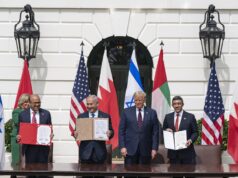French Foreign Minister Bernard Kouchner and Spanish Foreign Minister Miguel Moratinos are promoting an initiative by which the European Union would recognize a Palestinian state in 18 months, Haaretz reported Sunday. According to the plan, recognition would take place even if negotiations between Israel and the Palestinian Authority do not conclude. The initiative is based on a plan mapped out by Palestinian Prime Minister Salam Fayyad six months ago, which sought to establish a Palestinian state in two years. The Franco-Spanish proposal is meant to bolster the Fayyad plan by promising European support.
This would not be the first declaration of independence issued by the Palestinians. In 1948, the Mufti Haj Amin al-Husseini declared the independence of Palestine from Gaza. In November 1988, the Palestinian National congress declared unilateral plans for Palestinian statehood based on a United Nations resolution they had previously rejected – UN Resolution 181 – which partitioned two nations.
Israel responded in opposition to the recent Palestinian plan. According to Israeli officials, recognition would hinder the peace process by removing any reason for the Palestinians to negotiate. “Imposing this kind of semblance of a partial solution from outside goes against the very idea of peace,” a senior Israeli official said. He added, “Granting recognition when the issues of the conflict have not been settled would add fuel to the fire. This would only push the Palestinians to be even more intransigent and thus make any compromise impossible.”
But Kouchner and Moratinos may run into problems. Indeed, the EU did not support Palestinian leaders who declared they would seek Palestinian statehood from the UN last November. At that time, Swedish Foreign Minister Carl Bildt said, “I do not think we are there yet. I would hope that we would be in a position to recognize a Palestinian state, but there has to be one first. So I think that is somewhat premature.” Not much has changed since then.
Back in November, Jonathan Schanzer noted that “the Palestinians would hurt their national aspirations by failing to work with the Israelis.” As he explained, the decision would nullify existing agreements between the two sides, as well as “put an end to the Palestinians’ unrealistic claim on Jerusalem, or their insistence that Israel needs to accommodate thousands of Palestinians claiming refugee status.” In fact, even if backed by the EU, the creation of a Palestinian state outside of negotiations with Israel would most likely produce the same results.





